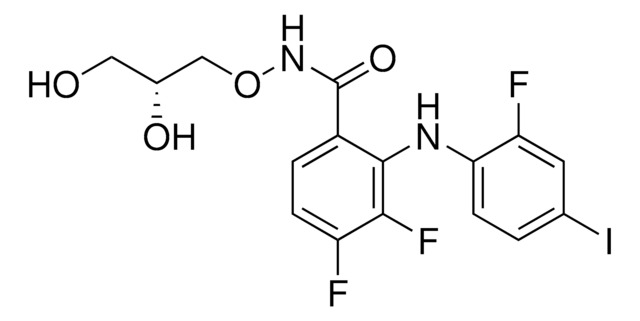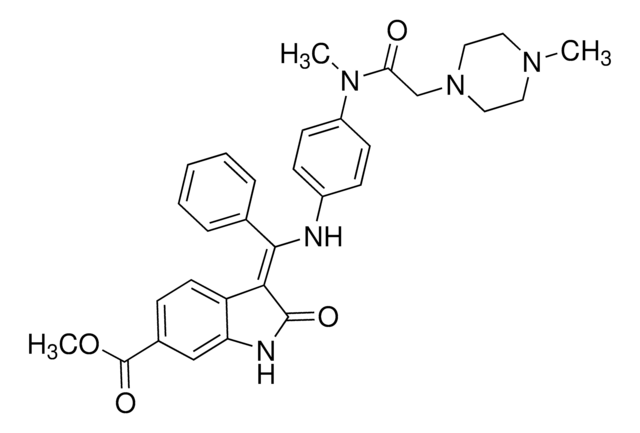SML1031
Bioymifi
≥98% (HPLC)
Synonym(s):
(Z)-5-(5-[(3-[4-Bromophenyl]-2-imino-4-oxothiazolidin-5-ylidene)methyl]furan-2-yl)isoindoline-1,3-dione
About This Item
Recommended Products
Quality Level
Assay
≥98% (HPLC)
form
powder
color
, orange to dark orange red
solubility
DMSO: 2 mg/mL, clear (warmed)
storage temp.
2-8°C
InChI
1S/C22H12BrN3O4S/c23-12-2-4-13(5-3-12)26-21(29)18(31-22(26)24)10-14-6-8-17(30-14)11-1-7-15-16(9-11)20(28)25-19(15)27/h1-10,24H,(H,25,27,28)/b18-10-,24-22?
InChI key
ULBOWKXOFOTCMU-NLDKGBHCSA-N
Biochem/physiol Actions
Features and Benefits
Signal Word
Warning
Hazard Statements
Precautionary Statements
Hazard Classifications
Acute Tox. 4 Oral
Storage Class Code
11 - Combustible Solids
WGK
WGK 3
Flash Point(F)
Not applicable
Flash Point(C)
Not applicable
Choose from one of the most recent versions:
Certificates of Analysis (COA)
Don't see the Right Version?
If you require a particular version, you can look up a specific certificate by the Lot or Batch number.
Already Own This Product?
Find documentation for the products that you have recently purchased in the Document Library.
Articles
n proliferating cells, the cell cycle consists of four phases. Gap 1 (G1) is the interval between mitosis and DNA replication that is characterized by cell growth. Replication of DNA occurs during the synthesis (S) phase, which is followed by a second gap phase (G2) during which growth and preparation for cell division occurs. Together, these three stages comprise the interphase phase of the cell cycle. Interphase is followed by the mitotic (M) phase.
Apoptosis, or programmed cell death (PCD), is a selective process for the removal of unnecessary, infected or transformed cells in various biological systems. As it plays a role in the homeostasis of multicellular organisms, apoptosis is tightly regulated through two principal pathways by a number of regulatory and effector molecules.
Our team of scientists has experience in all areas of research including Life Science, Material Science, Chemical Synthesis, Chromatography, Analytical and many others.
Contact Technical Service




![2-Methyl-7-oxo-4,7-dihydropyrazolo[1,5-a]pyrimidine-6-carboxylic acid AldrichCPR](/deepweb/assets/sigmaaldrich/product/structures/204/259/e1c44511-5ba6-4d2f-81e8-5d29de590d54/640/e1c44511-5ba6-4d2f-81e8-5d29de590d54.png)




